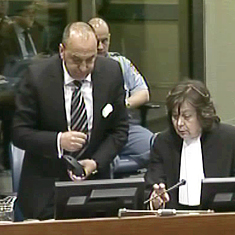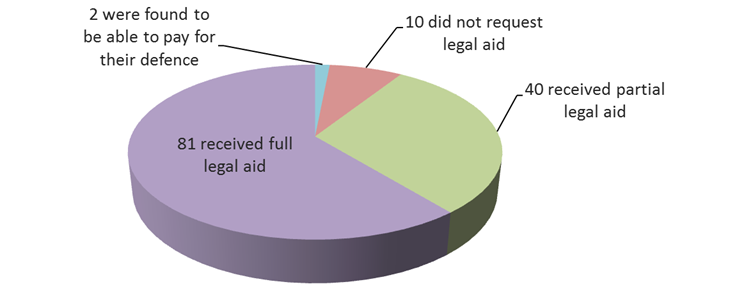The right to be represented by defence counsel, together with the presumption of innocence, is a fundamental right of all accused before the ICTY.
In accordance with the International Covenant on Civil and Political Rights and the European Convention for the Protection of Human Rights and Fundamental Freedoms, those accused before the Tribunal are entitled to a qualified defence counsel.
 Proceedings against an accused before the Tribunal are serious and complex and thus require appropriate means for mounting a defence case. Typically, a defence team is composed of a lead counsel and, depending on the size of the case, the team can include co-counsel, legal assistants, investigators and consultants.
Proceedings against an accused before the Tribunal are serious and complex and thus require appropriate means for mounting a defence case. Typically, a defence team is composed of a lead counsel and, depending on the size of the case, the team can include co-counsel, legal assistants, investigators and consultants.
When an accused claims indigence and requests the assignment of Tribunal-paid counsel, he/she is required to make full disclosure to the Registry of his/her means and assets, as well as those of members of his/her household.
If an accused is able to subsequently demonstrate that he/she lacks the means to remunerate counsel in whole or in part, he/she will be entitled to legal aid. Depending on the financial means of an accused, the Tribunal may cover the costs either in whole or in part of an accused’s defence. Self-represented accused who likewise demonstrate that they lack the means to remunerate members of their defence team, may be entitled to funding from the Tribunal.
Determining the indigence of an accused
The Registrar then conducts an inquiry into the accused’s means and assesses his disposable income. From the established pool of income and assets, the accused’s disposable means is calculated, but deductions are made for the estimated living expenses of the accused’s family and dependents for the estimated period in which the accused will require representation before the Tribunal. An accused who claims indigence has a legal duty to update his declaration of means at any time a change relevant to his or her financial status occurs.
If, as a result of the financial investigation the accused is found fully or partially indigent, counsel is assigned permanently and the accused’s defence costs are borne by the Tribunal in full or in part, respectively. In the latter case, the Registrar issues a decision determining the extent to which the accused is able to contribute towards the costs of his defence, and administers payments accordingly. If the accused is found to be fully non-indigent, his request for assignment of counsel is denied. Since December 2000 and as of June 2011, the Registry has found that 39 of the Tribunal's accused (including one accused for contempt) were able to contribute to their defence costs.
As of December 2013, out of 133 accused:

These figures include two individuals who had their indictments withdrawn
(Nenad Banović and Pero Skopljak).
> View ICTY Key Figures.
An accused who has requested the assignment of Tribunal-paid counsel must have counsel assigned to him or her from a list of qualified lawyers maintained by the Registrar, known as the “Rule 45 list”, or propose the assignment of another counsel whose qualifications are then vetted by the Registrar and appointed if his/her credentials satisfy the requirements set out in Rule 45 of the Rules of Procedure and Evidence of the Tribunal. The Registry has established a system of payment that is able to attract qualified defence counsel, with skills and experience that are comparable to the prosecution's senior trial attorneys.
Payment to an accused’s defence team is designed to include fees for its various members and covers all aspects of preparing and presenting the defence case, including reviewing the indictment and the supporting materials as well as all other documents provided by the prosecution or gathered through defence. It also covers the costs for interpretation, conducting investigations and research, interviewing witnesses, and arguing the case in court. Additional remuneration is available for defence experts.
“There are three levels of case complexity: level 1 – difficult; level 2 - very difficult; and level 3 – extremely difficult/leadership cases. ”
Payment to the appointed defence teams vary depending on the stage of the accused's case (whether it is in pre-trial, trial or appeal phase), and also how complex it is. There are three levels of case complexity: level 1 – difficult; level 2 - very difficult; and level 3 – extremely difficult/leadership cases.
In determining the complexity of a case, the Registry takes into account a number of factors, including: the accused's position within the political or military hierarchy; the number and nature of counts in the indictment; the number and type of witnesses and documents involved; whether the case involves crimes committed in a number of municipalities; and the novelty and complexity of legal and factual arguments the case will deal with.
Pre-trial legal aid policy
The Pre-Trial Legal Aid Policy lump sum payment system is designed to give counsel maximum flexibility in the use of resources and to allow Lead Counsel to use the lump sum to hire members of the Defence team in a manner that best suits the needs of the team. The Registrar must, however, approve all members of the team to ensure they are qualified and that there are no other ethical concerns. The lump sum is distributed in monthly stipends which are not meant to represent a monthly allotment of hours or a monthly salary.
The pre-trial stage consists of three phases: Phase One - the initial appearance phase; Phase Two — the phase in which preliminary motions and a work plan are submitted; and Phase Three — the trial preparation per se.
Pre-Trial Lump Sums (as of January 2013):
|
|
Phase One |
Phase Two |
Phase |
TOTAL |
Monthly Allotment |
|
Complexity Level 1 |
€1,873 |
€45,163 |
€104,750 |
€151,786 |
€1,109 maximum |
|
Level 2 |
€1,873 |
€45,163 |
€213,858 |
€260,895 |
|
|
Level 3 |
€1,873 |
€45,163 |
€377,695 |
€424,731 |
|
|
These amounts do not include the costs of Daily Subsistence Allowance (“DSA”) and travel which are covered separately in accordance with the applicable Registry policies. |
|||||
Trial legal aid policy
ICTY proceedings can be lengthy and consequently the Defence Counsel works for long periods of time, therefore distribution of the lump sum is phased throughout the trial. The Defence team will receive an up-front payment at the commencement of trial (representing 10 per cent of the lump sum), a monthly stipend, and a final End of Phase distribution (normally comprising approximately 20 percent of the lump sum). The up-front payment and monthly stipends are considered advance payments towards the lump sum rather than an allotment of hours.
The total lump sum for a phase is based on the following allotments, which are calculated with reference to the estimated duration of the case, and then distributed over its actual duration.
Trial legal aid scheme (as of January 2013):
|
|
Monthly Allotment |
Monthly allotment for interpretation and translation |
|
Complexity |
€28,556 + €3,328 = €31,884 |
€1,109 maximum |
|
Level 2 |
€28,556 + €9,985 = €38,541 |
€1,109 maximum |
|
Level 3 |
€28,556+ €16,641 = €45,197 |
€1,109 maximum |
Appeals legal aid policy
The Appeals Legal Aid Policy divides the Appeal Stage into two remunerable parts: (i) all work related to the preparation and filing of the Notice of Appeal, and (ii) all work related to the Appeal Phase, which encompasses the balance of the appeal, including the briefing period and the appeal hearing.
A maximum of 300 counsel hours and 300 support staff hours is allotted for the preparation and filing of a Notice of Appeal. Whenever a Notice of Appeal is filed against a trial judgement, the case is preliminarily ranked as a Level 1 (difficult) case for the Appeal Phase. The Level 1 case is then allotted a maximum of 1,050 hours for counsel and up to 450 hours for the work of support staff (which may include legal assistants, case managers, translators, and interpreters).
Upon request, a case may be upgraded in its complexity level. A Level 2 case (very difficult) is allotted 1,400 hours for counsel and 600 hours for support staff. A Level 3 case (extremely difficult) is allotted 2,100 hours for counsel and 900 hours for support staff. Additional payments are made for all hours spent in the courtroom by Defence counsel.
Funding for self-represented accused
Only an indigent or partially indigent accused may be eligible for the remuneration of his defence team by the Tribunal. The Remuneration scheme is based on a maximum allocation of hours to the accused’s support team depending on the stage of the proceedings and the complexity of the case.
With regard to self-represented accused, a lump sum payment system cannot be used. Instead, the Registry reviews invoices submitted and makes payments directly to support staff in accordance with the maximum hourly rates and allotments provided in the Remuneration Scheme.
According to the Remuneration Scheme, during the Pre-Trial stage there is a maximum of 150 hours per month per team member for two, three or five persons, depending on the complexity of the case, and up to a total of 3,000, 4,500 and 6,000 hours respectively. For the Trial stage, a maximum of 150 hours per team member may be billed per month for the duration of the trial, for up to two, three or five team members, for a total maximum of 300, 450 or 750 hours per month respectively. Finally at the appeals stage, there is a maximum of between 600 to 900 hours for the entire appeal phase, and a maximum of 100 hours per defence team member per month.
Support staff (legal associates, case managers, investigators and language assistants) have a fixed gross hourly rate ranging from €16.80 to €28.40 depending on years of experience.. Some legal associates to self represented accused, depending on their function, have applied to the Court and been granted an hourly rate of €78.80 in judicial decisions.

